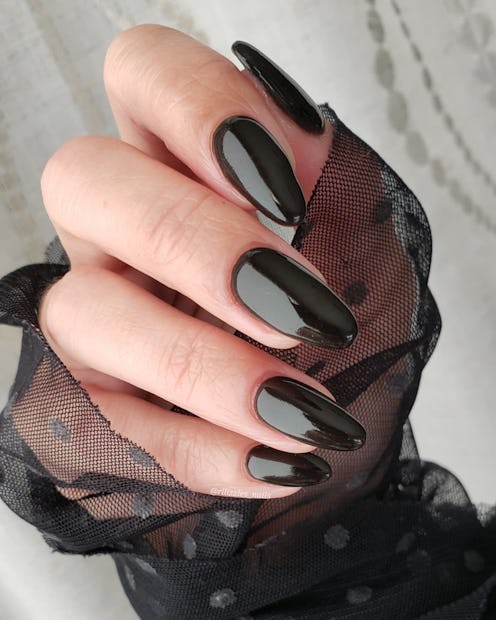(Nails)
You Might Want To Consider This Before Trying Powder Dip Nails
They look amazing — but at what cost?

The quest for the ultimate chip-free manicure is a timeless one. Since the advent of nail lacquer way back in 3000 BCE in China, fans of color and shine have been testing, inventing, and experimenting with all sorts of technological advances all promising the most even, long-lasting color. Dip powder is taking off thanks to its ease of application, chip-proof shell, and endless shade options. But is dip powder bad for your nails, or is it safer than its more traditional alternatives? TZR takes a look at exactly how dip powder works, what process is happening with the nail beds below it, and taps a series of top nail professionals for an expert’s take on the dip powder phenomenon.
Read more: My Acrylic-Damaged Nails Looked Terrible Until I Tried These 12 Solutions
First thing’s first: Even though many salons may advertise dip powder nails — essentially, powdered acrylic polishes sealed with heavy-duty base coats and topcoats — as “natural” or “organic,” that’s not quite right. Those terms (along with clean, green, and non-toxic), are not regulated by the FDA. As for why powder nails are being marketed this way in the first place, it’s because they are said to carry fewer toxins than acrylics or gels.
The main benefit to opting for this treatment over gels — besides the fact that dip powder nails can last a full eight weeks without chipping — is that no UV light is needed to seal the polish. Studies show the UV light emitted from nail lamps slightly increases your risk of developing skin cancer; it’s even been found that in less than 10 minutes under the gel lamp, “a person’s hands receive an energy dose equivalent to the day-long recommended limit for outdoor workers,” according to the Journal of American Academy of Dermatology.
Is Dip Powder Safe?
Even without the UV light, many have safety concerns about dip powder nails. “I personally don’t like dip powder for a variety of reasons, the first being sanitary concerns,” Mazz Hanna, a professional nail artist known for working with Emma Roberts and Kacey Musgraves, tells TZR. “You technically aren’t supposed to dip different clients’ fingers into the same pot, even though this is something salons do quite often.” Dipping nails directly into a pot of powder, or even sprinkling powder on top of the nail and letting the excess fall back into the pot, increases the risk of bacterial contamination, which can lead to infection. This should be a non-issue at reputable salons, but as Hanna says, it happens.
Getting the fine powder to actually stick to the nail poses another potential risk. Dip powder nails require a base coat of cyanoacrylate… which is the main ingredient in Krazy Glue. Forms of this ingredient are restricted for use in cosmetics in Canada and classified as an irritant by the European Union, per the Environmental Working Group; but as of now, they are cleared for use in the United States.
As one can imagine, removing a manicure set with Krazy Glue isn’t the easiest thing in the world. Like gels and acrylics, powder dip nails need to be soaked off in acetone — and the longer your dip powder mani has been on, the longer it will take to soak off. Since acetone is not great for nails — it dries them out and leaves them susceptible to breakage and peeling — a 30-minute soak twice a month could significantly weaken and damage nails over time.
Finally, the powder itself may be problematic. “The product is basically just glorified acrylic, which is notoriously toxic and damaging to the nail plate,” Hanna says. Acrylics and dip powder nails share the same base ingredient, acrylic ester polymer, just in different forms. One study on rabbits and guinea pigs in the International Journal of Toxicology found that in high concentrations (to be clear: higher concentrations than would be on your nails), the ingredient is carcinogenic and has the potential to cause “dermal irritation” and “nasal irritation.”
All that being said, opinions on the safety of dip powder nails vary, and there’s just not enough data out there to say, point-blank, that dip powder nails are dangerous. As long as you’re visiting a reputable salon with the right safety precautions in place, it’s probably fine to try the trend for yourself — just remember to give your natural nails a break every once in a while.
This article was originally published on